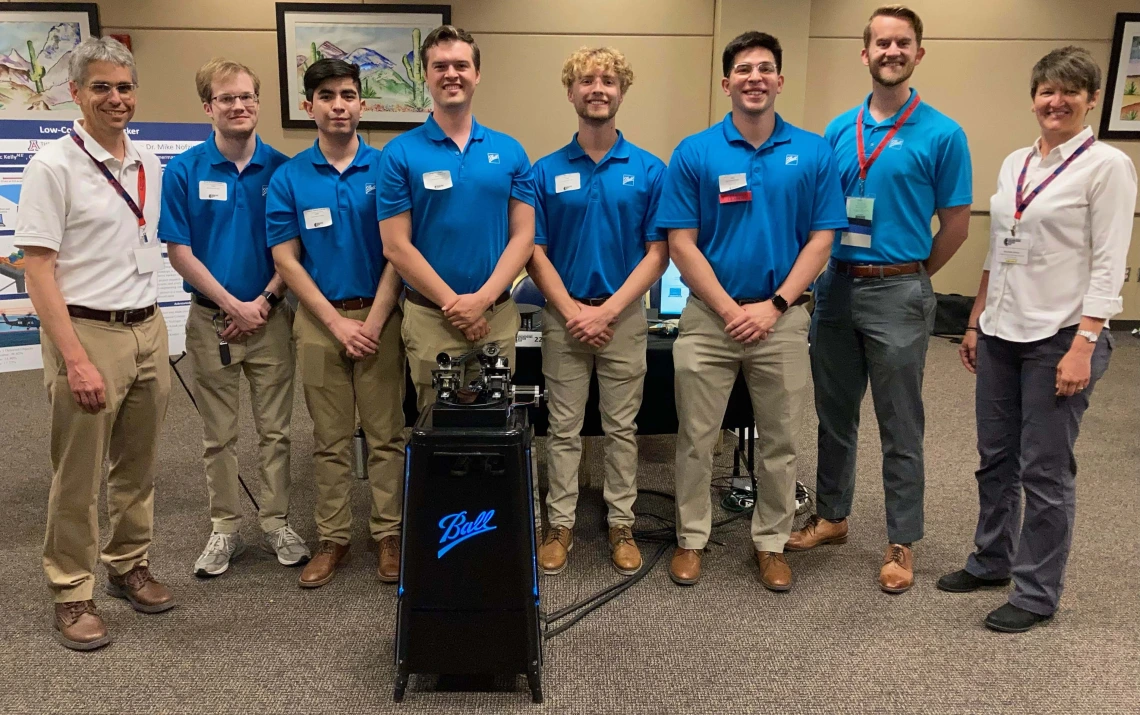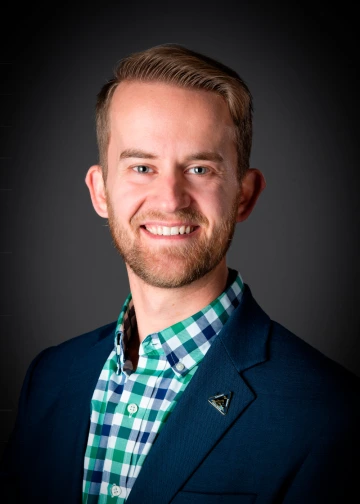From Student to Sponsor: Q&A with Benjamin Cromey

Benjamin Cromey, second from right, poses with the team Ball Aerospace sponsored for the 2021-2022 academic year and other Ball associates.
Benjamin Cromey earned his bachelor's degree in optical sciences and engineering from the University of Arizona in 2015, then continued with a PhD in optical sciences in 2020. He’s now a senior optical engineer at Ball Aerospace in Boulder, Colorado.
Tell us a little bit about the capstone project you did when you were a student.

My senior design project was the Automated Optical Surface Defect Detection System sponsored by Edmund Optics. Our goal was automating the inspection process for checking the surface quality of a specific three-sided prism. Normally a technician would manually inspect each prism side for scratches and such and would rate the surface quality based on their visual estimation and experience. Edmund wanted an automated method that could return qualitative measurements of imperfections. Our solution incorporated an illumination system, an imaging system, some clever optomechanics for quickly rotating the prism to inspect all three sides, and a software system for automatically finding defects. Our team won the Thorlabs Photonics is the Future award for best optics/optomechanics at Design Day.
Did your experience in the capstone program prepare you for your career and/or continued studies?
Absolutely! I’m functioning as an optical systems engineer on one of my programs here at Ball Aerospace, and currently we are in the requirement verification/sell off phase for the optical components, which has had various lessons from senior design reverberating in my mind.
I used the engineering process during my PhD to guide the development of a microscope system and forced myself to complete a critical design review to my professor. Helping teach the course was even more beneficial for the technical leadership experience it gave me over a large variety of design problems.
How long has your company been sponsoring projects? How long have you personally been involved with it?
Ball Aerospace has been sponsoring projects since the 2017-2018 academic year. I helped teach the course as a student mentor under Michael Nofziger during my PhD. At Ball Aerospace, I helped out with the 2020-2021 team and have been in charge of our projects since 2021.
What teams have you worked with? Can you share a little bit about the team you currently work with and how they’re doing?
I’ve worked with over 30 teams between teaching the course and now sponsoring projects. This year, Team 23019 is building an optical scatterometer, a device used to measure how light interacts with a surface. Knowing how light interacts with a particular material is crucial to predicting (and preventing!) the unwanted ways light can scatter around your optical system and eventually reach your detector.
The team’s device will be used for easy measurements in the lab by the optical engineers here at Ball Aerospace. The team has had some challenges with missing skill sets because of the distribution of students assigned – no mechanical engineer, for example. Despite that, they’re pulling through, and it has been great to see several students embracing roles outside of their normal discipline. I’m looking forward to seeing their final product in May at Design Day!
What are some of the most rewarding moments?
For many students, this course is their first time facing a much more open-ended problem, something a textbook or course may not have explicitly prepared them for. For me, it’s very rewarding helping students walk outside of their comfort zones and develop new skills necessary for the success of the project. When a student admits they don’t know how to do something in September, and then by February is presenting good results using that new skill, you know you’ve made an impact in developing that student to become an even better engineer.
Would you recommend the sponsor experience to other companies and alumni?
Sponsoring a project is a win-win-win for all parties involved. Ball Aerospace gets an extended interview with the team over the course of the year, giving us a chance to offer internships and full-time positions to team members. The students get to have an interesting project relevant to what we do at Ball and be mentored by experienced engineers who support the project. Lastly, I get to stay connected to the University of Arizona, which I really enjoy.

